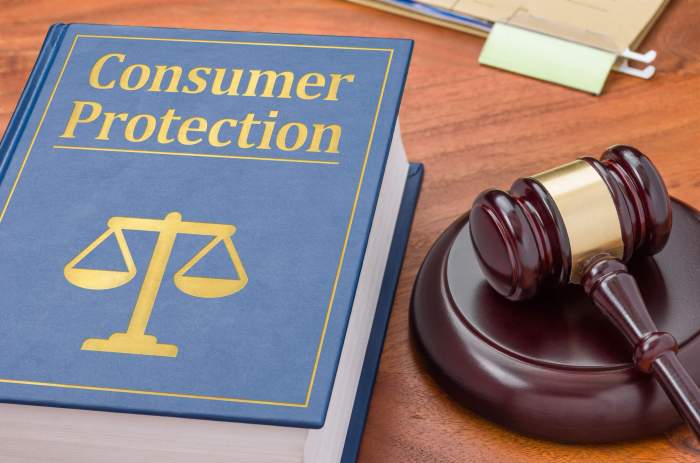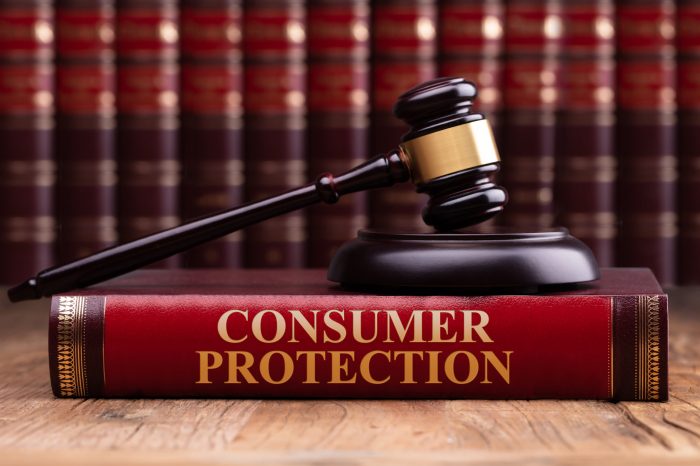Consumer Protection Lawyers: Guardians of Consumer Rights in a Complex Marketplace
In today’s intricate consumer landscape, the rights of individuals navigating the complexities of the marketplace require vigilant protection. Enter consumer protection lawyers – ardent advocates dedicated to safeguarding consumers from unethical practices, ensuring fairness, and empowering individuals to assert their rights.
Consumer protection law, a cornerstone of modern jurisprudence, stands as a shield against deceptive advertising, defective products, and fraudulent schemes that threaten consumer well-being. These legal guardians play a pivotal role in upholding justice, fostering transparency, and promoting ethical conduct within the marketplace.
Consumer Protection Law
Consumer protection law is a body of laws and regulations designed to protect consumers from unfair or deceptive business practices. It covers a wide range of issues, including product safety, advertising, and credit and lending. Consumer protection laws are essential for ensuring that consumers are treated fairly and that they have the information they need to make informed decisions about the products and services they purchase.The
history of consumer protection laws can be traced back to the early 1900s, when the United States began to experience a wave of consumer fraud and abuse. In response, the federal government passed a number of laws designed to protect consumers, including the Pure Food and Drug Act of 1906 and the Federal Trade Commission Act of 1914. These laws were followed by a number of state laws that further strengthened consumer protections.Today,
consumer protection laws are enforced by a variety of government agencies, including the Federal Trade Commission (FTC), the Food and Drug Administration (FDA), and the Consumer Financial Protection Bureau (CFPB). These agencies work to ensure that businesses comply with consumer protection laws and that consumers are treated fairly.
Common Consumer Protection Issues
Consumer protection law aims to protect consumers from unfair or deceptive practices by businesses. Common consumer protection issues include fraud, deceptive advertising, defective products, and identity theft.
These issues can have serious consequences for consumers, ranging from financial losses to physical harm. In some cases, consumers may also experience emotional distress or a loss of trust in the marketplace.
Fraud
Fraud is a type of consumer protection issue that involves intentionally deceiving consumers for personal gain. Fraudulent practices can take many forms, such as:
- Pyramid schemes: These schemes promise high returns on investment but are actually designed to enrich the scheme’s creators at the expense of later investors.
- Advance-fee loans: These loans require consumers to pay a fee upfront before receiving the loan, but the loan is never actually disbursed.
- Identity theft: This occurs when someone uses another person’s personal information without their consent to obtain credit, goods, or services.
Deceptive Advertising
Deceptive advertising is a type of consumer protection issue that involves making false or misleading claims about a product or service. Deceptive advertising can take many forms, such as:
- Bait-and-switch advertising: This occurs when a business advertises a product or service at a low price to attract customers, but then switches to a more expensive product or service once the customer is in the store.
- False advertising: This occurs when a business makes false or misleading claims about a product or service, such as its features, benefits, or price.
- Comparative advertising: This occurs when a business compares its product or service to a competitor’s product or service in a way that is misleading or unfair.
Defective Products
Defective products are a type of consumer protection issue that involves products that are dangerous or unsafe for consumers. Defective products can cause a variety of injuries, including:
- Physical injuries: Defective products can cause cuts, burns, bruises, and other physical injuries.
- Property damage: Defective products can damage property, such as furniture, appliances, and vehicles.
- Economic losses: Defective products can cause consumers to lose money, such as when a product breaks down or fails to perform as advertised.
Identity Theft
Identity theft is a type of consumer protection issue that involves the unauthorized use of someone’s personal information. Identity theft can be used to obtain credit, goods, or services in the victim’s name. Identity theft can also be used to file fraudulent tax returns or to open fraudulent bank accounts.
Rights and Responsibilities of Consumers

Consumers hold a significant position in the marketplace, and understanding their rights and responsibilities is crucial for creating a balanced and fair economic environment. This section explores the fundamental rights consumers possess and their corresponding responsibilities in protecting their own interests.
Fundamental Rights of Consumers
Consumers enjoy several fundamental rights that empower them in their interactions with businesses and service providers. These rights include:
- Right to Information: Consumers have the right to receive accurate, clear, and timely information about products and services, including their features, benefits, and potential risks. This enables them to make informed purchasing decisions.
- Right to Safety: Consumers have the right to expect that the products and services they purchase are safe for their intended use. Manufacturers and service providers are responsible for ensuring the safety of their offerings.
- Right to Redress: If consumers encounter defective products or unsatisfactory services, they have the right to seek redress through various channels, such as filing complaints with regulatory agencies, seeking mediation or arbitration, or pursuing legal action.
Responsibilities of Consumers
While consumers enjoy certain rights, they also have responsibilities in protecting their own interests. These responsibilities include:
- Conducting Research: Before making purchases, consumers should conduct thorough research to gather information about the products or services they intend to buy. This includes reading reviews, comparing prices, and understanding the terms and conditions associated with the purchase.
- Reporting Suspicious Activities: Consumers should be vigilant in identifying and reporting suspicious activities related to products or services. This includes reporting counterfeit goods, unsafe products, or fraudulent practices to the appropriate authorities.
Importance of Consumer Education and Awareness
Consumer education and awareness play a vital role in promoting responsible consumer behavior. Educating consumers about their rights and responsibilities empowers them to make informed decisions, recognize potential risks, and take appropriate actions to protect their interests. It also fosters a sense of responsibility among consumers, encouraging them to conduct thorough research, report suspicious activities, and engage in ethical consumption practices.
Role of Consumer Protection Lawyers

Consumer protection lawyers play a vital role in safeguarding the rights and interests of consumers in various situations. They advocate for consumers’ rights, help resolve disputes with businesses, and seek compensation for damages caused by unfair or deceptive practices.
Advocating for Consumers’ Rights
Consumer protection lawyers serve as advocates for consumers’ rights, ensuring that businesses comply with consumer protection laws and regulations. They work to protect consumers from unfair practices such as false advertising, deceptive marketing, and predatory lending. By advocating for consumers’ rights, these lawyers help create a fair and competitive marketplace where consumers can make informed decisions.
Seeking Legal Assistance for Consumer Protection Issues
If you’re facing consumer protection issues, seeking legal assistance can help you understand your rights, pursue fair compensation, and hold businesses accountable for their actions.
Choosing a Qualified Consumer Protection Lawyer
Finding a qualified consumer protection lawyer is crucial. Look for attorneys with experience handling similar cases, a strong understanding of consumer protection laws, and a track record of successful outcomes. Check online reviews, ask for referrals from friends or family, or consult local bar associations for recommendations.
Preparing for a Legal Case
Before contacting a lawyer, gather relevant documents, such as contracts, receipts, warranties, and correspondence with the business. Make detailed notes of your experiences, including dates, times, and specific details of the issue. Keep records of any attempts to resolve the matter directly with the business.
Potential Costs and Benefits
Pursuing legal action can involve costs, including attorney fees, court fees, and expert witness fees. Weigh these potential costs against the potential benefits, such as compensation for damages, reimbursement of expenses, and injunctive relief to prevent future harm. Consider the emotional toll and time commitment involved in a legal case.
Consumer Protection in the Digital Age
The digital age has transformed the way consumers interact with businesses and access products and services. This rapidly evolving landscape presents both challenges and opportunities for consumer protection.
The widespread adoption of e-commerce, social media, and online advertising has created a new set of consumer risks. These include concerns about data privacy and security, deceptive marketing practices, and the proliferation of counterfeit and unsafe products. At the same time, digital technologies have also empowered consumers with new tools to research products and services, compare prices, and file complaints against businesses.
Impact of E-commerce on Consumer Protection
E-commerce has revolutionized the way consumers shop, offering convenience, a wide selection of products, and competitive prices. However, it has also raised concerns about consumer protection. Some of the key challenges include:
- Deceptive Marketing Practices: Online retailers may engage in misleading advertising, such as using fake reviews, making false claims about product quality, or hiding important information.
- Data Privacy and Security: E-commerce transactions involve the collection and storage of personal information, which can be vulnerable to hacking and data breaches. Consumers may also be tracked online to collect data for targeted advertising, raising concerns about privacy.
- Counterfeit and Unsafe Products: The ease of selling products online has made it easier for counterfeiters and unscrupulous sellers to peddle fake or unsafe products.
Conclusion
As the consumer landscape continues to evolve, consumer protection lawyers remain steadfast in their commitment to safeguarding the rights of individuals. Their unwavering dedication to justice ensures that consumers can navigate the marketplace with confidence, knowing that their interests are fiercely advocated and protected.









